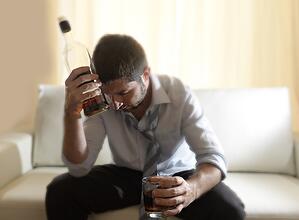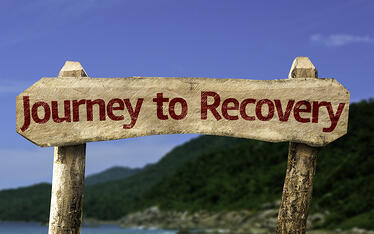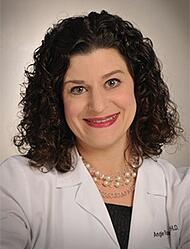Ever drink coffee too close to bed and find yourself staring at the ceiling? Or take an Adderall only to toss and turn all night? What about making a desperate reach for a sedative, a leftover pain pill, or a nightcap to help you get to sleep? If so, you might be caught up in the chemical insomnia cycle.

For some, using a stimulant or a sedative might be an occasional habit; while for others, it happens almost daily. Some habitual users will overuse stimulant medications, relying on these to help them be awake, alert and functional throughout their day while others will rely more on the sedatives to unwind them when it is time for sleep- and others may do both.
Sometimes this reliance on uppers to be awake and downers to get to sleep is unintentional, the byproduct of trying to manage a chronic health problem with prescribed medication or maybe even an attempt to stabilize a mental health problem like depression, ADD or anxiety.
Whatever the reason, those who take mind-altering drugs (prescribed or un-prescribed), should be aware of the way they might be further impairing their health or mental health by robbing themselves of adequate sleep.
The Hot Topic of Sleep
Researchers are learning just how essential a good night’s sleep is to all aspects of health and happiness. One bad night of sleep can set someone up for a really bad day; they might be irritable, moody, less able to make sound choices, retain information, and think clearly.
Many nights of bad sleep is much more dangerous, increasing their risk of being injured or getting into an accident, developing a serious health issue, and even deleting years off their life.
The regular use of almost all drugs, including alcohol, carry near identical health risks, impairing cognitive and physical functioning in very similar ways as well. To add to this, people who use these substances also are much more likely to describe experiencing problems with sleep.
This means is many who use these substances are doubly at risk for experiencing these negative effects because they are also probably not getting enough sleep.
Substances Can Hinder Quality Sleep
It doesn’t seem to matter what kind of drug a person abuses- as both sedative users and stimulant users struggle with similar sleep disturbances. Researchers found both groups sleep less overall, spent more time trying to fall asleep, wake up more, and have less of the restorative slow-wave sleep known to be essential to their health.
The lack of sleep creates a vicious cycle for those who struggle with substance abuse, since sleep-deprived people are known to be at increased risk for drug use, and for those in recovery, more likely to relapse.
Regardless of what drugs are being abused or whether they are prescribed or not, regular drug use impacts sleep in ways that make people much more vulnerable to a range of health and mental health complications, including the risk of more serious addiction.
Breaking the Addiction Cycle
The good news for those who want to break this habit is that over time, the cycle can be broken and the damage usually reversed. When a regular drug user stops using, it is likely that they will experience a temporary increase in insomnia; but over time, their sleep patterns should normalize.

Either way, consultation with a medical provider is often a good first step towards making informed decisions about how to address both the underlying addiction and also the sleep disturbances. This consultation is also important because for some, it may be necessary to come up with a plan to avoid or lessen any symptoms of withdrawal.
Surviving Withdrawal
Withdrawal can look very different from person to person; it is dependent on what drug(s) they have used, how frequently, how much and for how long. Withdrawal from certain drugs is simpler than from others, so it is important to talk with a medical or health professional to know what to expect and what, if any, safeguards need to be put into place.
One might need to cut down slowly on the amount of a drug or medication they are taking or take another medication to support the withdrawal process while others can safely stop “cold turkey”. In certain cases, it may be necessary or helpful for a person to also enroll into addiction treatment, where they can get support from a licensed professional who can help them learn how to cope with urges, develop healthier habits, and build a new sober lifestyle.
Coming Out of the Dark Happier and Healthier
As a person gets clean and sober, their brain chemistry will begin to normalize, and the old “addiction pathways” in the brain which caused strong cravings will become less active. This is part of the healing and recovery process, and a positive indication that the brain is healing some of the damage done by drugs.
You or your loved one will benefit greatly from developing healthy lifestyle habits, including a schedule that dedicates at least 7-8 hours a night for sleep. While their body adjusts to the new schedule and lifestyle, they may experience some transient insomnia.
Sometimes this can be addressed by developing good sleep hygiene, or practices that are known to promote sleep, including not using technology an hour before bed, eliminating artificial light from the bedroom, and developing a nighttime relaxation ritual that cues the body and brain for sleep.
Final Thoughts
Most people are aware that drug use and sleep deprivation are harmful to a person’s physical and mental health, but might not be aware how many people struggle with both.
Regular users of medications like prescribed stimulants, sedatives, prescription painkillers, or of substances like cocaine, marijuana, or even alcohol, have high rates of sleep disturbance. Overall, these users sleep less, wake up more, and don’t sleep as well, placing them at higher risk for the many known health problems associated with sleep deprivation.
These individuals are also at higher risk for drug use, even if they have stopped using, creating a vicious cycle that greatly increases their risk for health and mental health problems. Breaking this cycle is possible only through taking the necessary steps to establish sobriety, allowing the brain and bodies to heal, and beginning to live in ways they feel good about- all factors that tend to lead to a good night’s sleep.
How Alaska Sleep Clinic Can Help You
Angie Randazzo, PhD, is a licensed clinical psychologist at St. Luke’s Sleep Medicine and Research Center, St. Louis, MO. She began treating sleep-disordered patients at the Sleep Medicine and Research Center at St. Luke’s Hospital in 1993.

She has 25 years of experience treating all types of sleep disorders, including insomnia, delayed sleep phase, sleep apnea, shift work and daytime fatigue/sleepiness, using behavioral techniques. Behavioral interventions target behaviors and thinking that maintain or worsen sleep disturbances, and the techniques teach patients self-management skills to improve their sleep and resume healthy, normal sleep.
Dr. Randazzo’s primary research interests include insomnia, clinical pharmacology, sleep deprivation and the relationship of sleep and behavior. She has conducted more than 100 clinical research trials, and she is the author of 18 publications on the topic of sleep, including sleep restriction in children, for which she received the 1997 American Sleep Disorders Association Young Investigator Award.
Impaired sleep can seriously affect your quality of life and productivity. Behavioral changes implemented under the guidance of an experienced clinician can improve sleep quality and help you feel more alert and functional on a regular basis. Sleep is a third of your life – make it count!
Alaska Sleep Clinic is the most comprehensive multi-site sleep lab in Alaska with clinics in Anchorage, Wasilla, Fairbanks, and Soldotna. We continue to expand our services to those with sleep disorders. Angie Randazzo, PhD, is a specialist in cognitive behavioral therapy (CBT) with expertise in sleep disorders. No other CBT sleep specialist provides care in the state of Alaska. She is available to Alaska Sleep Clinic’s patients via telemedicine, through SleepTM.













